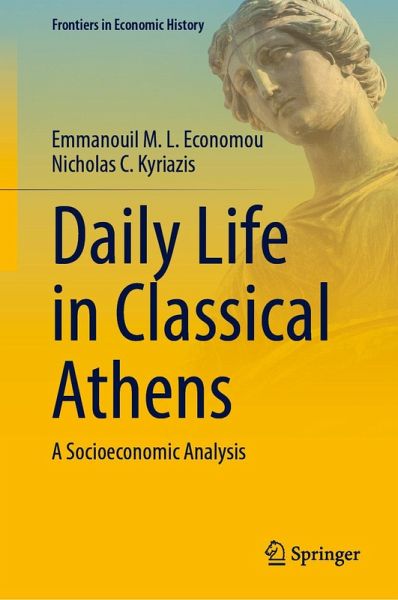
Daily Life in Classical Athens (eBook, PDF)
A Socioeconomic Analysis
Versandkostenfrei!
Sofort per Download lieferbar
104,95 €
inkl. MwSt.
Weitere Ausgaben:

PAYBACK Punkte
52 °P sammeln!
This book presents the economic heartbeat and institutional details that shaped Athenian society during the Classical period (508-323 BCE), employing an innovative and outside-the-box approach to studying history. It answers questions about societal structure, the roles of women, foreigners, and slaves, the transformation of their economy from agrarian to maritime, and commercially-oriented. 28 short fictional stories enliven the narrative, each accompanied by rigorous academic analysis - revealing how banking, insurance, and the Athenian drachma, the internationally accepted currency of the t...
This book presents the economic heartbeat and institutional details that shaped Athenian society during the Classical period (508-323 BCE), employing an innovative and outside-the-box approach to studying history. It answers questions about societal structure, the roles of women, foreigners, and slaves, the transformation of their economy from agrarian to maritime, and commercially-oriented. 28 short fictional stories enliven the narrative, each accompanied by rigorous academic analysis - revealing how banking, insurance, and the Athenian drachma, the internationally accepted currency of the times, shaped their world.
Exploring the symbiotic relationship between democracy and economic evolution, the book examines the sophisticated economic institutions of ancient Athens -ranging from property rights protection to market-driven price determination, anti-profiteering measures, measures to protect the Athenian currency's trustworthiness from forgery, business and labor mentality and practices, international trade patterns, as well as the existence of a robust public sector related also to the provision of a series of public goods. In a comprehensive analysis, the book scrutinizes daily life, societal structures, and customs, addressing a variety of questions such as marriage, cuisine, attire, values, and entertainment.
Employing New Institutional Economics as a methodology, the book puts together historical evidence with institutional analysis, offering an interdisciplinary lens through economics, political science, strategy, and behavioral theory. Richly supported by ancient sources, inscriptions, and a vast modern bibliography, this work not only explains ancient Athens but also proposes its socioeconomic pattern as a guide for modern societal challenges in economic governance and democracy.
Exploring the symbiotic relationship between democracy and economic evolution, the book examines the sophisticated economic institutions of ancient Athens -ranging from property rights protection to market-driven price determination, anti-profiteering measures, measures to protect the Athenian currency's trustworthiness from forgery, business and labor mentality and practices, international trade patterns, as well as the existence of a robust public sector related also to the provision of a series of public goods. In a comprehensive analysis, the book scrutinizes daily life, societal structures, and customs, addressing a variety of questions such as marriage, cuisine, attire, values, and entertainment.
Employing New Institutional Economics as a methodology, the book puts together historical evidence with institutional analysis, offering an interdisciplinary lens through economics, political science, strategy, and behavioral theory. Richly supported by ancient sources, inscriptions, and a vast modern bibliography, this work not only explains ancient Athens but also proposes its socioeconomic pattern as a guide for modern societal challenges in economic governance and democracy.
Dieser Download kann aus rechtlichen Gründen nur mit Rechnungsadresse in A, B, BG, CY, CZ, D, DK, EW, E, FIN, F, GR, HR, H, IRL, I, LT, L, LR, M, NL, PL, P, R, S, SLO, SK ausgeliefert werden.












